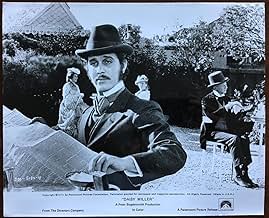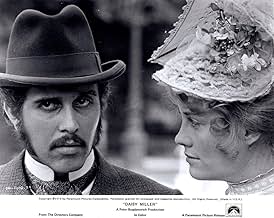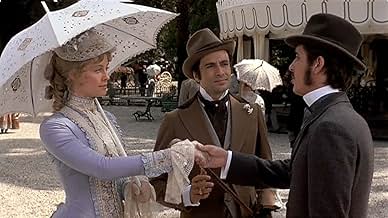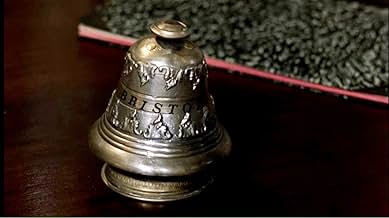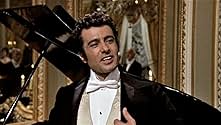AVALIAÇÃO DA IMDb
6,2/10
2,2 mil
SUA AVALIAÇÃO
Nesta comédia de costumes, Frederick Winterbourne tenta descobrir a brilhante Daisy Miller, apenas para ser ajudado e impedido por falsos julgamentos de seus amigos.Nesta comédia de costumes, Frederick Winterbourne tenta descobrir a brilhante Daisy Miller, apenas para ser ajudado e impedido por falsos julgamentos de seus amigos.Nesta comédia de costumes, Frederick Winterbourne tenta descobrir a brilhante Daisy Miller, apenas para ser ajudado e impedido por falsos julgamentos de seus amigos.
- Direção
- Roteiristas
- Artistas
- Indicado a 1 Oscar
- 1 vitória e 1 indicação no total
- Direção
- Roteiristas
- Elenco e equipe completos
- Produção, bilheteria e muito mais no IMDbPro
Avaliações em destaque
I strongly disagree with the limited, parochial, and dismissive comments of other reviewers' comments. Daisy Miller is a superb and literal adaptation of the Henry James novella. It is still a joy to watch and enjoy this period piece which is perfectly cast. I completely agree with Orson Welles that Cybill Shepherd was born to play Daisy Miller. Her performance is effortless and she aptly embodies Daisy in both looks and spirit. Bogdanovich was right on the mark with the casting of Ms. Shepherd. While it is true she was his girl friend at the time, it is also true that she was perfect for the role. Her interpretation involves rushing through the dialogue as if she couldn't wait for a response so she in turn could reply and in this case it is exactly what Daisy would have done. Cybill Shepherd was at the apex of her beauty and talent in Daisy Miller. She had just starred in three great American films-Last Picture Show, Heartbreak Kid, and Taxi Driver. Daisy Miller could easily be considered along with the three aforementioned film. When I am bored with high tech films, loud action adventure films, and post modern films, I often return with great pleasure to the sumptuous and beautifully realized Daisy Miller.
Many reviewers here seem to have confused the story and characters with the film and the actors.
Yes, Daisy in the film is rather flat and monotonous. But that's a high compliment -- that the ravishing Cybill Shepherd could so accurately portray such a flat character. Henry James at one point describes Daisy's expression as a "light, slightly monotonous smile", in another her voice as a "little soft, flat monotone". He says late in the story that "there was always, in her conversation, the same odd mixture of audacity and puerility". No, she wouldn't be a very pleasant person to be around for long. But that was part of James's point: that our attraction to people (especially those of the opposite sex) often defies reason. Shepard makes the point well.
Some have commented that they wished the story had been filled out. Some of those apparently haven't read the story. One of those critics even places the story wrong by forty years. Though called a novella, it's barely more than a short story. In fact the film does a remarkable job of portraying the events and (more importantly) the characters very much as they are in the story. The great majority of the dialog in the film is verbatim from the story.
In some instances, the scenes and characters were significantly expanded from the James story. How far should a director go, if the aim is to film a classic story, not just to make something derived from that story? James's characters were pretty flat, a lot flatter than those in the film. One could justifiably criticize the film for telling the story far better than James did.
Do you think James's story is dated and flat in the modern world? Well, in many ways so do I. A polemical assault on discrimination based on manners and birth is truly dated. Yet an assault on personal discrimination remains fully current. The modern world is certainly not devoid of personal discrimination. Perhaps it's not often so ugly, not in the first world anyway, but prejudice is very much alive.
James's story is also unsubtle: two groups of people with differing views, one person caught with one foot in each camp, unhappy results. That's about it. Should one film the classic story, or build something different? It's a choice; great films have been made both ways. The choice for this film was unambiguous: to film the classic story.
The photography is truly gorgeous -- the film (at least the outdoor parts) was shot on location in Vevey, Switzerland and Rome, Italy. Despite the long stretches of dialog, including Daisy's run-on commentaries, one need not strain to understand the words. If the story were as good as the production and acting (several good performances) then this would be a 10. The faithfulness to the original weights it down.
Yes, Daisy in the film is rather flat and monotonous. But that's a high compliment -- that the ravishing Cybill Shepherd could so accurately portray such a flat character. Henry James at one point describes Daisy's expression as a "light, slightly monotonous smile", in another her voice as a "little soft, flat monotone". He says late in the story that "there was always, in her conversation, the same odd mixture of audacity and puerility". No, she wouldn't be a very pleasant person to be around for long. But that was part of James's point: that our attraction to people (especially those of the opposite sex) often defies reason. Shepard makes the point well.
Some have commented that they wished the story had been filled out. Some of those apparently haven't read the story. One of those critics even places the story wrong by forty years. Though called a novella, it's barely more than a short story. In fact the film does a remarkable job of portraying the events and (more importantly) the characters very much as they are in the story. The great majority of the dialog in the film is verbatim from the story.
In some instances, the scenes and characters were significantly expanded from the James story. How far should a director go, if the aim is to film a classic story, not just to make something derived from that story? James's characters were pretty flat, a lot flatter than those in the film. One could justifiably criticize the film for telling the story far better than James did.
Do you think James's story is dated and flat in the modern world? Well, in many ways so do I. A polemical assault on discrimination based on manners and birth is truly dated. Yet an assault on personal discrimination remains fully current. The modern world is certainly not devoid of personal discrimination. Perhaps it's not often so ugly, not in the first world anyway, but prejudice is very much alive.
James's story is also unsubtle: two groups of people with differing views, one person caught with one foot in each camp, unhappy results. That's about it. Should one film the classic story, or build something different? It's a choice; great films have been made both ways. The choice for this film was unambiguous: to film the classic story.
The photography is truly gorgeous -- the film (at least the outdoor parts) was shot on location in Vevey, Switzerland and Rome, Italy. Despite the long stretches of dialog, including Daisy's run-on commentaries, one need not strain to understand the words. If the story were as good as the production and acting (several good performances) then this would be a 10. The faithfulness to the original weights it down.
Ms. Shepherd's fluttery, busy, yet essentially one-note performance undermines an effortful, well-pedigreed adaptation of a seemingly unfilmable work. The screenplay is nimble and witty, the photography lush, the locations dazzling, the supporting cast well-chosen -- how can anyone not respond to Mildred Natwick in anything? But it's all up to the star, and here, she's not up to it. Admittedly, Daisy is a shallow character, but a more thoughtful actress would give her more dimension (today, maybe, Gwyneth Paltrow could do it).
It's irresistible to consider the parallels between real life and reel life: The young Bogdonavich dotes on his leading lady as blindly as Barry Brown's character dotes on Daisy. But the poignancy is tempered somewhat when you consider that this nattering, uninteresting young lady would be absolute hell to live with.
It's irresistible to consider the parallels between real life and reel life: The young Bogdonavich dotes on his leading lady as blindly as Barry Brown's character dotes on Daisy. But the poignancy is tempered somewhat when you consider that this nattering, uninteresting young lady would be absolute hell to live with.
Excellent adaptation of the Henry James story about a willful girl in Europe and the price she pays.
Peter Bogdanovich does an excellent job in recreating the long-ago world when Americans of means made "the grand tour" and saw everything there was to see in Europe. The leisurely world of the moneyed classes before World War I is beautifully realized here with breathtaking scenery, sets, and costumes. Just perfect.
This film has been unjustly maligned for more than 30 years and needs to be re-assessed. The cast is just about perfect.
Cybill Shepherd is the perfect Daisy. A naive girl from Schenectady who talks nonstop and flirts with all the men. The old women among the expatriate set think she's wicked, not very innocent, etc. But the callow American-born Winterbourne (Barry Brown) who has been educated in Geneva falls for her simple ways and beauty. Is she a mantrap? Or is she just what she seems to be.... a slightly silly girl who is a little too headstrong? Shepherd chatters and flirts to perfection, leaving Brown a flustered and confused suitor. Cloris Leachman is the ditzy mother. Mildred Natwick is the world-weary aunt. Eileen Brennan is the catty widow. Duilio del Prete is the "little Roman." Several scenes are standouts: Shepherd singing "Maggie" is a highlight. She sings nicely and is beautifully framed in a large window. The "spa" scene with Natwick and Brown is hilarious as the various "bathers" loll about in the hot-spring pool with various items floating about on inflated pillows. The aunt and nephew are taking tea while two old men play chess.... A vase with flowers drifts by... Oh so languid and leisurely an age. Og course being a Henry James story, poor Daisy does get her comeuppance.
The film is a total treat, filled with good acting and humor and those gorgeous views of Vevey, Switzerland.
Peter Bogdanovich does an excellent job in recreating the long-ago world when Americans of means made "the grand tour" and saw everything there was to see in Europe. The leisurely world of the moneyed classes before World War I is beautifully realized here with breathtaking scenery, sets, and costumes. Just perfect.
This film has been unjustly maligned for more than 30 years and needs to be re-assessed. The cast is just about perfect.
Cybill Shepherd is the perfect Daisy. A naive girl from Schenectady who talks nonstop and flirts with all the men. The old women among the expatriate set think she's wicked, not very innocent, etc. But the callow American-born Winterbourne (Barry Brown) who has been educated in Geneva falls for her simple ways and beauty. Is she a mantrap? Or is she just what she seems to be.... a slightly silly girl who is a little too headstrong? Shepherd chatters and flirts to perfection, leaving Brown a flustered and confused suitor. Cloris Leachman is the ditzy mother. Mildred Natwick is the world-weary aunt. Eileen Brennan is the catty widow. Duilio del Prete is the "little Roman." Several scenes are standouts: Shepherd singing "Maggie" is a highlight. She sings nicely and is beautifully framed in a large window. The "spa" scene with Natwick and Brown is hilarious as the various "bathers" loll about in the hot-spring pool with various items floating about on inflated pillows. The aunt and nephew are taking tea while two old men play chess.... A vase with flowers drifts by... Oh so languid and leisurely an age. Og course being a Henry James story, poor Daisy does get her comeuppance.
The film is a total treat, filled with good acting and humor and those gorgeous views of Vevey, Switzerland.
For his first film un color Peter Bodanovich chose a most curious and arcane subject, 19th century novel by Henry James. Daisy Miller on screen is an Americaniized version of onr of those films that the Merchant-Ivory team do
so well with for British subjects.
Our title role is played by Cybill Shepherd and Daisy is a rather ingenuous girl traveling with her mother Cloris Leachman and much younger brother James McMurtry. They're over from, Schenectady where the father made big money and employed a lot of the town.
The Millers are the subject of much gossip by other expatriate Americans like Mildred Natwick and Eileen Brennan. Mainly because they don't know the ropes and Daisy scandalizes them by going out unescorted and with European men who are after American virtue and money.
Barry Brown is Natwick's nephew and an expatriate student. He's the only one who finds Shepherd intriguing, but won't break convention.
Shot on location in Switzerland and Rome the film really captures the look and feel of 19th century Europe. Daisy Miller got an Oscar nomination for costume design. It's beaitifully crafted and sad that the film did not do so well at the box office.
I guess Henry James was out of season.
Our title role is played by Cybill Shepherd and Daisy is a rather ingenuous girl traveling with her mother Cloris Leachman and much younger brother James McMurtry. They're over from, Schenectady where the father made big money and employed a lot of the town.
The Millers are the subject of much gossip by other expatriate Americans like Mildred Natwick and Eileen Brennan. Mainly because they don't know the ropes and Daisy scandalizes them by going out unescorted and with European men who are after American virtue and money.
Barry Brown is Natwick's nephew and an expatriate student. He's the only one who finds Shepherd intriguing, but won't break convention.
Shot on location in Switzerland and Rome the film really captures the look and feel of 19th century Europe. Daisy Miller got an Oscar nomination for costume design. It's beaitifully crafted and sad that the film did not do so well at the box office.
I guess Henry James was out of season.
Você sabia?
- CuriosidadesAccording to Peter Bogdanovich, Hollywood legend Orson Welles said that actress Cybill Shepherd was born to play Daisy Miller, but he didn't want to direct Daisy Miller (1974).
- Citações
Annie P. 'Daisy' Miller: I'm a terrible, frightful flirt. Did you ever hear of a nice girl that wasn't? But now I guess you'll tell me I'm not a nice girl.
- ConexõesFeatured in Daisy Miller: An Introduction by Peter Bogdanovich (2003)
Principais escolhas
Faça login para avaliar e ver a lista de recomendações personalizadas
- How long is Daisy Miller?Fornecido pela Alexa
Detalhes
- Data de lançamento
- País de origem
- Idiomas
- Também conhecido como
- Una señorita rebelde
- Locações de filme
- Empresas de produção
- Consulte mais créditos da empresa na IMDbPro
Bilheteria
- Orçamento
- US$ 2.200.000 (estimativa)
Contribua para esta página
Sugerir uma alteração ou adicionar conteúdo ausente



